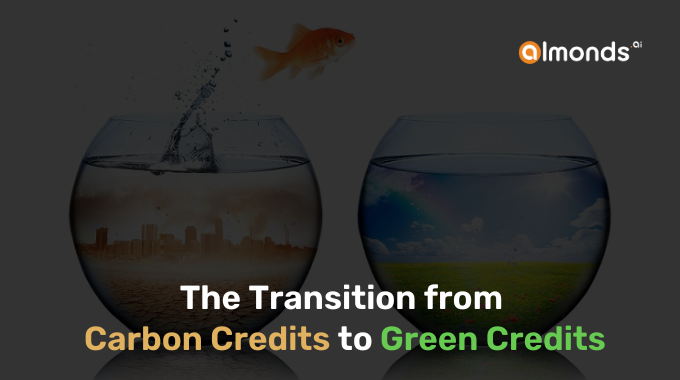Environmental degradation and climate change are global issues with far-reaching consequences. Without action, 3 billion people could face chronic water scarcity, and the global economy might lose 18% of GDP by 2050. Over the past two decades, global efforts have been made to address these challenges, but individual and community actions have been overlooked. However, the United Nations Environment Programme (UNEP) states that if one billion out of eight billion people adopt eco-friendly behaviors, global carbon emissions could decrease by 20%.
In that context, at COP26 in Glasgow on November 1, 2021, the Hon’ble Prime Minister introduced the ‘LiFE‘ – ‘Lifestyle for Environment’ movement, marking a significant step toward promoting environmental consciousness and sustainability in India.
Building on this vision, the Ministry of Environment, Forest and Climate Change has unveiled two pioneering initiatives, the Green Credit Program (GCP) and the Ecomark Scheme. These initiatives exemplify India’s proactive stance towards climate change, sustainability, and the promotion of eco-conscious practices, in line with the LiFE concept.
Understanding Green Credit Programs
The Green Credit Program (GCP), launched on October 13, 2023, is a groundbreaking market-based mechanism designed to encourage voluntary environmental actions across diverse sectors. It targets various stakeholders, including individuals, communities, private sector industries, and companies. The GCP is governed by an inter-ministerial Steering Committee, with the Indian Council of Forestry Research and Education (ICFRE) serving as the GCP Administrator, overseeing program implementation, management, monitoring, and operation.
In its initial phase, the GCP focuses on two key activities:
- Water conservation
- Afforestation
Draft methodologies for awarding Green Credits have been developed, and they will undergo stakeholder consultation. These methodologies establish benchmarks for each activity, ensuring environmental impact and fungibility across sectors.
A user-friendly digital platform will simplify project registration, verification, and the issuance of Green Credits. The Green Credit Registry and trading platform, developed by ICFRE in collaboration with experts, will facilitate the registration and trading of Green Credits.
The Ecomark Scheme: Promoting Eco-Friendly Products
Aligned with the LiFE philosophy, the Ministry of Environment, Forest and Climate Change has revised the Ecomark notification to empower consumers to choose eco-friendly products.
The new Ecomark Scheme, introduced on October 13, 2023, replaces the previous notification. It offers accreditation and labeling for household and consumer products that meet specific environmental criteria while maintaining quality standards according to Indian norms. Products accredited under this scheme will adhere to stringent environmental criteria, ensuring minimal environmental impact.
The Ecomark Scheme aims to raise consumer awareness about environmental issues and encourage eco-conscious choices. Moreover, it serves as an incentive for manufacturers to transition to environmentally friendly production practices. The scheme also aims to ensure accurate product labeling, preventing misleading information.
Transitioning from Carbon Credits to Green Credits
Now, you might be wondering why this transition from carbon credits to green credits is significant. Carbon credits, which were prevalent in the past, essentially allowed companies to offset their carbon emissions by investing in projects that reduced an equivalent amount of carbon elsewhere. While this was a step in the right direction, the focus has shifted to green credits for several crucial reasons.
Green credits are about not just offsetting emissions but actively promoting environmental actions and practices. They incentivize stakeholders to engage in activities that go beyond mere carbon offsetting. These activities encompass water conservation, afforestation, and more, addressing a wider spectrum of environmental concerns.
The Role of Green Loyalty Programs
So, how do green loyalty programs fit into this transition and why are they essential? Green loyalty programs, as part of the LiFE concept, play a pivotal role in driving sustainable practices. They encourage individuals and entities to participate actively in environmental initiatives. Here’s how:
- Enhanced Customer Engagement: Green loyalty programs enhance customer loyalty and engagement by aligning their values with eco-conscious practices.
- Word-of-Mouth Marketing: Loyal customers become brand advocates, contributing to marketing efforts without the need for significant expenses.
- Reduced Advertising Costs: The positive brand image created by green loyalty programs may lead to reduced advertising expenses.
- Sustainability Awareness: These programs boost consumer awareness of sustainability issues and motivate eco-conscious choices.
- Manufacturer Incentives: Green loyalty programs encourage manufacturers to transition to environmentally friendly production practices, aligning with the eco-friendly criteria of green credits.
- Promote Friendly Competition: Introduce a leaderboard or points system. Participants can compete to earn more rewards by outdoing each other in environmental actions.
Ready to embrace a more sustainable future? Consider Almonds AI’s Green Loyalty Program. By joining, you become a part of a growing movement towards sustainability. Earn rewards, make eco-conscious choices, and champion a greener planet with us. Together, we’ll create a significant impact on our environment.
To sum it up, the move from carbon credits to green credits is a game-changer in how we look after our environment. Those nifty green loyalty programs? They’re like the spark that gets individuals, communities, and businesses all fired up about eco-friendly actions. By getting cozy with green credits and the LiFE concept, we’re all on board for a greener, more eco-responsible future. Our carbon footprint gets smaller, and the planet gets healthier. This transition is a big step towards a more environmentally aware and sustainable India.







